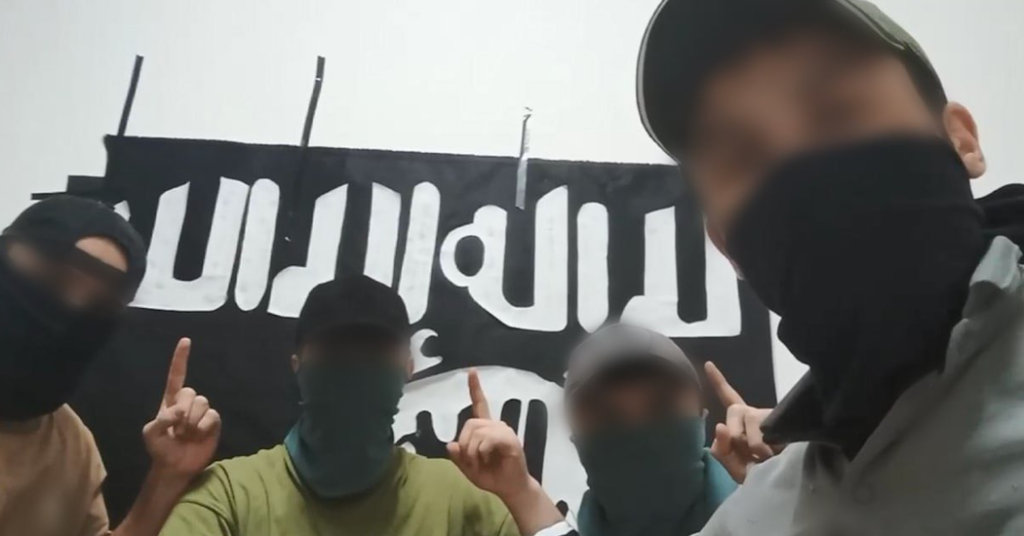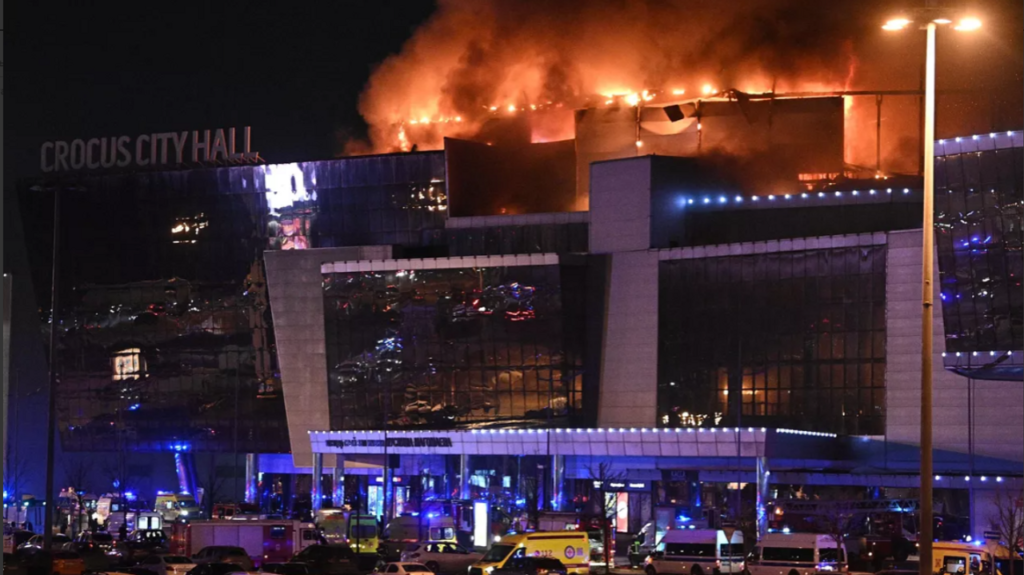Last Friday, an appalling massacre at a concert in Moscow left the world in shock. The attack, which claimed the lives of 137 people, targeted a crowded venue in a display of extreme violence. The perpetrators, who have been identified as Tajik nationals, were captured shortly afterward. Three of the four suspects confessed to their role in what has been termed a terrorist attack. It was also revealed that at least one assailant had been financially compensated for his involvement, a deviation from the typical profile of Islamist operatives motivated by ideology rather than profit.
The Islamist faction ISIS-K claimed responsibility for the massacre, later confirmed by a video release from ISIS’s media outlet. This connection points to a potential link between ISIS and the attackers, though the exact level of coordination remains unclear. Meanwhile, Western media quickly endorsed ISIS’s involvement, dismissing speculations that might implicate Ukraine as “absurd.”
While Russian President Vladimir Putin stopped short of directly blaming Kyiv, he alluded to the possibility that the attackers had been en route to Ukraine. He noted that the suspects were intercepted near the Ukrainian border, hinting at a potential cross-border involvement.

Was ISIS Responsible?
At first glance, all signs appear to implicate ISIS or an affiliated offshoot, such as ISIS-K. The horrific nature of the attack — indiscriminately targeting civilians and invoking extremist slogans — bears the hallmarks of ISIS’s brutal tactics. The assailants, armed with detailed knowledge of the venue, seemed well-prepared and familiar with escape routes, indicating extensive planning characteristic of ISIS operations.
However, there are key anomalies. Unlike ISIS’s usual approach, which often involves attackers fighting to the death or using suicide tactics, these gunmen attempted to flee the scene. Furthermore, when confronted, they surrendered without resistance — an unusual act for Islamist militants, who typically regard surrender as dishonorable.
The suspects even discarded their weapons before their capture, further complicating the narrative. This deviation from ISIS’s established patterns raises questions about who orchestrated the attack and whether these attackers might have been working for other interests.
Putin also highlighted an additional oddity: the attackers appeared to have been promised a route to Ukraine. Considering the tightly controlled and fortified border between Russia and Ukraine, it seems unlikely that they could have crossed easily. This raises the possibility that the attackers were given false assurances or misled about their escape plan.
Mercenary Motives?
Further complicating the investigation is the revelation that one of the suspects received monetary payment for his involvement. This is not consistent with typical ISIS recruitment methods, where recruits are motivated by ideological fervor rather than financial reward. The fact that these men were paid raises suspicions that they might have been operating as mercenaries rather than ideological extremists.
In light of ISIS’s reduced influence following defeats in Syria and Iraq, there may be disenfranchised former fighters willing to take up arms for financial gain, irrespective of religious ideology. In such cases, the question remains: who funded and directed this operation?

Ukraine and the “Asymmetrical” Warfare Strategy
Since the fall of Avdiivka, many analysts agree that Ukraine’s position has become untenable. Western leaders are openly warning of an impending Ukrainian collapse without additional military support, which Congress has withheld for months. Yet rather than pursuing diplomatic solutions, tensions are escalating, and NATO countries continue to funnel resources into a conflict that shows no signs of yielding a Ukrainian victory.
With Ukrainian losses mounting and Western nations reluctant to directly intervene, Kyiv may be exploring “asymmetrical” warfare options. In early 2024, Ukrainian intelligence chief Kyrylo Budanov suggested that non-traditional tactics, including cross-border operations, would play a role in Ukraine’s defensive strategy. Recent attempts to breach Russian border areas, as well as targeted sabotage missions within Russia, bear Budanov’s signature style. However, these operations have yielded limited success, with Russia consistently repelling attacks and inflicting heavy casualties.
Budanov, known for his experience in covert operations, has built a reputation in Kyiv for masterminding attacks on strategic Russian assets. With increasing desperation on the Ukrainian side, some speculate that Budanov might resort to dramatic and destabilizing actions inside Russia to undermine Russian morale and shift the narrative. Whether this includes leveraging connections with mercenary groups or subcontracting operations to extremist factions remains speculative but plausible.
Geopolitical Implications of the Moscow Attack
With the West swift to endorse ISIS’s responsibility for the Moscow massacre, questions arise about the CIA’s involvement. Just a week prior, the U.S. issued warnings to American citizens in Russia about potential terror threats, a move that Moscow dismissed as alarmist. Following the attack, Western media outlets have pointed fingers at Russian intelligence for ignoring these alerts. Yet, Moscow asserts it received no actionable intelligence from the U.S. prior to the attack, leaving open questions about the extent of American knowledge and involvement.
The possibility of Ukrainian involvement, although dismissed by Western media, remains a consideration in Russia’s strategic assessment. With ISIS potentially acting as a proxy for another state or intelligence agency, it is feasible that the organization’s claim of responsibility could serve as a cover for broader geopolitical objectives.
Given the desperation of the Ukrainian situation, it is not inconceivable that Kyiv might resort to shock tactics to pressure Moscow. Although no concrete evidence ties Ukraine directly to the Moscow attack, Russia’s security services continue to investigate possible linkages between Ukrainian operatives and Islamist factions.
The Strategic Fallout for Russia and Ukraine
If the objective was to weaken Putin’s position, the Moscow massacre has had the opposite effect. Putin’s approval ratings, already high, have surged further as Russians respond to this act of terror with a renewed sense of unity. Western leaders, puzzled by Putin’s enduring popularity, fail to recognize the unifying effect of external threats on Russian sentiment. With NATO expansion and anti-Russian rhetoric escalating, many Russians view the West as a direct adversary, a sentiment that bolsters domestic support for Putin’s policies.
Far from destabilizing Russia, the attack has strengthened the Kremlin’s hand. Moscow has responded by intensifying missile strikes on Ukrainian military targets, including key airfields. Speculation about a new wave of Russian mobilization has surfaced, with reports of enthusiastic volunteers signing up to defend Russia against what is increasingly seen as an existential threat.

Unanswered Questions and the Role of Western Intelligence
The speed with which the U.S. attributed responsibility to ISIS raises questions about the depth of American involvement or foreknowledge of the attack. Washington’s swift dismissal of any Ukrainian involvement was issued without conclusive investigation, leaving a lingering sense of ambiguity. How much did Western intelligence services know, and where did they obtain their information?
Two theories currently dominate the discourse. One posits that the massacre was solely an ISIS operation. The other suggests a possible Ukrainian hand in the attack, perhaps indirectly via Islamist intermediaries. For now, the truth remains elusive. What is clear is that the tragedy in Moscow has reinforced Russia’s resolve and, if anything, has rallied public support for the ongoing war in Ukraine.
As investigations continue, it is uncertain whether the full story behind the massacre will emerge. But in the absence of clarity, Ukraine may well bear the repercussions, as Russia intensifies its efforts to secure its borders and stymie foreign interference.

